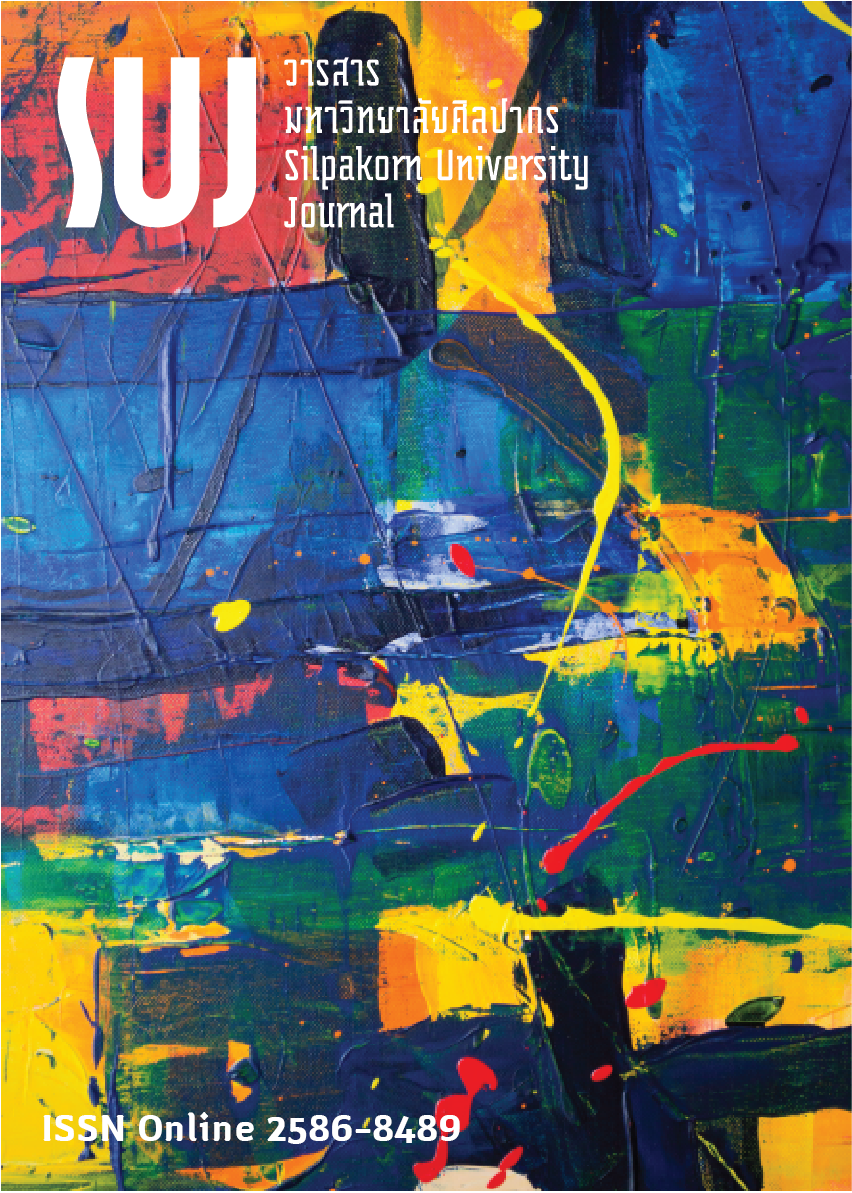แนวทางพัฒนาความรู้บัญชีครัวเรือนเพื่อการท่องเที่ยวโดยชุมชนอย่างพอเพียง กรณีศึกษา ชุมชนบ้านไม้ขาว จังหวัดภูเก็ต (The development of household accounting for sufficient community based tourism: A case study of Mai Khao community, Phuket)
Main Article Content
Abstract
บทความวิจัยนี้มีวัตถุประสงค์เพื่อศึกษาสภาพปัญหา ความต้องการจำเป็นในการจัดทำบัญชีครัวเรือน และเสนอแนะแนวทางการพัฒนาความรู้บัญชีครัวเรือนของชุมชนบ้านไม้ขาว จังหวัดภูเก็ต โดยใช้ระเบียบวิธีวิจัยแบบผสม (mixed method) ในการเก็บรวบรวมข้อมูลเชิงปริมาณด้วยแบบสอบถาม จำนวน 241 ชุด และเก็บรวบรวมข้อมูลเชิงคุณภาพด้วยการสัมภาษณ์แบบเจาะลึก จำนวน 22 ชุด และการสนทนากลุ่ม โดยได้ทำการวิเคราะห์ข้อมูลเชิงปริมาณด้วยสถิติ ได้แก่ ร้อยละ ค่ามิว ส่วนเบี่ยงเบนมาตรฐานประชากร และค่าดัชนี โดยจัดเรียงลำดับความต้องการจำเป็น (PNIModified) และวิเคราะห์ข้อมูลเชิงคุณภาพด้วยการวิเคราะห์เชิงเนื้อหา (content analysis) ผลการศึกษาพบว่า กลุ่มประชากรขาดความรู้ความเข้าใจ ทำให้ไม่สามารถทำบัญชีครัวเรือนได้ด้วยตนเอง ขาดการทำบัญชีครัวเรือนอย่างสม่ำเสมอ และไม่นิยมทำบัญชี เนื่องจากรายจ่ายไม่สมดุลกับรายรับ ผลการประเมินสรุปได้ว่า ความต้องการจำเป็นสูงสุดคือ ความต้องการด้านทักษะ และด้านคุณลักษณะส่วนบุคคล โดยมีค่า PNIModified เท่ากับ 0.28 รองลงมาคือ ด้านความรู้ มีค่า PNIModified เท่ากับ 0.22 ส่วนค่า PNIModified≥0.30 มีจำนวนทั้งหมด 5 ตัวแปร ได้แก่ 1. ความน่าเชื่อถือในการจัดทำบัญชี 2. ทักษะการจัดทำบัญชีตามหลักปรัชญาของเศรษฐกิจพอเพียง 3. ทักษะการบันทึกบัญชีได้อย่างสะดวกและรวดเร็ว 4. ทักษะการทำบัญชีครัวเรือนได้อย่างถูกต้องโดยใช้ระยะเวลาที่เหมาะสม และ 5. ทักษะการสรุปข้อมูลบัญชีครัวเรือนได้อย่างถูกต้องและครบถ้วน ซึ่งสามารถนำมากำหนดแนวทางการพัฒนาความรู้ระดับครัวเรือน โดยอบรมให้ความรู้เรื่องบัญชีครัวเรือน สร้างแรงจูงใจให้มีการลงมือปฏิบัติ และปรับเปลี่ยนทัศนคติที่มีต่อการทำบัญชี ส่วนแนวทางระดับกลุ่มท่องเที่ยวโดยชุมชน คือ การให้คำปรึกษาแก่กลุ่มที่เริ่มต้นทำบัญชีครัวเรือน พร้อมทั้งติดตาม ทบทวนแผนการจัดทำบัญชี และเรียนรู้จากแนวปฏิบัติที่เป็นเลิศของกลุ่มอื่น เพื่อให้การจัดทำบัญชีครัวเรือนเพื่อการท่องเที่ยวโดยชุมชนอย่างพอเพียงมีความต่อเนื่องและยั่งยืน
This research article aimed to study problems and needs in household accounting preparation and provides the guidelines of accounting knowledge development for Ban Mai Khao community, Phuket. The mixed - method is used in the research to gather the quantitative data by using 241 questionnaires, and the qualitative data is collected through 22 in-depth interviews and group communication. The quantitative data is analyzed through statistics including percentage, mu (µ), population standard deviation and the Modified Priority Needs Index (PNIModified), whereas the qualitative data is inspected with the content analysis. The findings show that people lack understanding of household accounting and this resulted in their incapability to do it. In addition, they lacked continuity in conducting household accounting, and have negative attitudes towards conducting household accounting because of the imbalance of their expenses and income. Statistically, the PNIModified value of personal skills and characteristics is 0.28, followed by knowledge which is 0.22. PNIModified values ≥ 0.30 consisting of the following five valuables: 1. reliability in accountancy, 2. accounting skills according to the philosophy of sufficiency economy, 3. easy and quick accounting skills, 4. precisely accounting, 5. concluding expenses skills in household accounting. The findings can be generated as guidelines to develop knowledge at the household level by providing knowledge of household accounting, motivating people to do the accountancy and changing personal attitude towards bookkeeping. The guidelines for the local tourism are establishing a mentoring system to help and support the beginners, following up and reviewing accounting plans, and providing opportunities to learn from other groups’ best practices. All of these are to stimulate the community to continually and sustainably prepare household accounts for tourism.
Downloads
Article Details

This work is licensed under a Creative Commons Attribution-NonCommercial-NoDerivatives 4.0 International License.
References
Alias, N., Bakar, N. A., Sadique, R. M., & Haron, N. H. (2016). Household Accounting: Road to Economic Resilience. The Social Sciences Medwell Journals, 11(20): 4912-4917.
Day, P. E. (2010). Household Budget & Managing Debt. Ohio: Academy of Financial Literacy.
Juraevna, T. M. (2018). Features of Establishing Accounting Policy in Tourism Enterprises. Business and Economics Journal, 9(2): 1-4.
Karagorgos, T., Drogalas, G., Pazarskis, M., & Christodoulou, P. (2008). Accounting Systems for Tourism in an International Context. [Online]. Retrieved April 22, 2019 from https://www.researchgate.net/publication/27385334_Accounting_systems_for_Tourism_in_an_International_Context
Lapeyre, R. (2010). Community-based Tourism as a Sustainable Solution to Maximize Impacts Locally? The Tsiseb Conservancy Case, Namibia. Development Southern Africa, 27(5): 757-772.
Mai Khao Subdistrict Administrative Organization. (2021). Tourist Attraction (แหล่งท่องเที่ยว). [Online]. Retrieved April 22, 2019 from http://www.maikhaow.go.th/travel/detail/198
Mai Khao Village Community. (2017). Village Development Report, Mai Khao Village, Thalang District, Phuket Province (รายงานการพัฒนาหมู่บ้าน บ้านไม้ขาว หมู่ 4 อำเภอถลาง จังหวัดภูเก็ต). Phuket: Mai Khao Subdistrict Administrative Organization and Thalang District Community Development Office.
Manokarn, Sathit. (2017). Developing Household Account Preparation for Self-Reliance in Baan Na Lae Community, Silalang Sub-District, Pua District, Nan Province (การพัฒนาการจัดทำบัญชีครัวเรือนเพื่อการพึ่งพาตนเองในชุมชน บ้านนาแล ตำบลศิลาแลง อำเภอปัว จังหวัดน่าน). Master’s dissertation, Maejo University, Chiang Mai, Thailand.
Marin, D. (2015). Study on the Economic Impact of Tourism and of Agrotourism on Local Communities. Research Journal of Agricultural Science, 47(4): 160-163.
Mas, I., & Mukherjee, P. (2013). Searching for Metaphors of Household Financial Management. [Online]. Retrieved December 6, 2020 from https://papers.ssrn.com/sol3/papers.cfm?abstract_id=2137494
Nilmanee, Thunchanok, Pongput, Srisamorn, Saewong, Jutamart, & Imchongchairak, Orapin. (2015). The Study of Behavior and Factor Problems on Household Accounting of Agriculturist in Prachinburi Province (การศึกษาพฤติกรรมและสภาพปัญหาการจัดทำบัญชีครัวเรือนตามปรัชญาเศรษฐกิจพอเพียงลดปัญหาหนี้สินของเกษตรกร จังหวัดปราจีนบุรี). Bangkok: Rajamangala University of Technology Rattanakosin.
Office of the National Economic and Social Development Council. (2016). The National Economic and Social Development Plan, The Twelfth Plan (2017-2021) (แผนพัฒนาเศรษฐกิจและสังคมแห่งชาติ ฉบับที่ 12 พ.ศ.2560-2564). Bangkok: Office of the National Economic and Social Development Council.
Office of the National Economic and Social Development Council. (2018). National Strategy 2018-2037 (ยุทธศาสตร์ชาติ พ.ศ.2561-2580). Bangkok: Office of the National Economic and Social Development Council.
Phillip, E. (2010). Household Budget & Managing Debt (2nd ed.). Arisona: Academy of Financial Literacy.
Ramlugan, V., Ramdhony, D., & Poornima, B. (2016). An Evalution of Household Accounting in Mauritius. International Journal of Accounting and Financial Reporting, 6(2): 62-76.
Rant, D., Horvat, R., Tominc, P., & Korošec, B. (2017). Household Accounting – A Case of Subsidised Self-Employed Entrepreneurs in Slovenia. Nase Gospodarstvo/ Our Economy, 63(2): 32-41.
Roska, V., Martincevic, I., & Sesar, V. (2018). Accounting Education for Better Employment - Case Study in Croatia. In 28th International Scientific Conference on Economic and Social Development, (pp. 312-330). Varazdin: Varazdin Development and Entrepreneurship Agency (VADEA).
Ruengsinpinya, Pathra. (2012). Home Accounting (บัญชีครัวเรือนเรื่องใกล้ตัวที่ถูกมองข้าม). MIS Journal of Naresuan University, 7(1): 20-28.
Sarobol, Sinth. (2003). Community Based Tourism: Concept and Experience in Northern Thailand (การท่องเที่ยวโดยชุมชน แนวคิดและประสบการณ์พื้นที่ภาคเหนือ). Chiang Mai: Wanida Press.
Wallace, W. H. (2014). Household Accounting. New York: The Palmer Series Commercial.
Wongwanit, Suwimon. (2005). Needs Assessment Research (การวิจัยประเมินความต้องการจำเป็น). Bangkok: Chulalongkorn University.
Yotasing et al. (2020). The Study of Behavior and Problems of Household Accounting of The Sufficiency Economy Philosophy : Case Study in Baan Khaonoi Community, Phrathat Bang Phuan Sub-district, Muang District, Nongkhai Province (การศึกษาพฤติกรรมและสภาพปัญหาการจัดทำบัญชีครัวเรือน ตามแนวคิดหลักปรัชญาเศรษฐกิจพอเพียง : กรณีศึกษาชุมชนบ้านเก่าน้อย ตำบลพระธาตุบังพวน อำเภอเมือง จังหวัดหนองคาย). [Online]. Retrieved December 6, 2020 from https://ms.udru.ac.th/ACresearch/assetspdf/20200425102905.pdf


